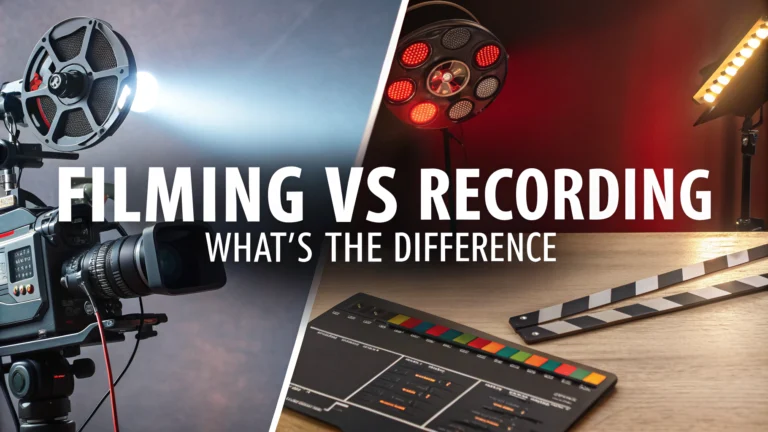The terms filming and recording often get mixed up, yet they serve different purposes in capturing visual and audio content. While both document moments, their technical approaches and end results can vary significantly.
Whether you’re starting a YouTube channel or creating professional content, knowing the distinctions between filming and recording helps you choose the right method for your project.
Key Technical Differences
Filming traditionally refers to capturing moving images using a camera, while recording encompasses a broader spectrum of capturing both audio and visual content.
- Filming focuses on:
- Visual composition
- Camera movements
- Lighting setups
- Recording includes:
- Audio capture
- Screen recording
- Live streaming
Equipment Requirements
Each method requires specific tools and setup considerations.
| Filming Equipment | Recording Equipment |
|---|---|
| Video cameras | Microphones |
| Lighting gear | Audio interfaces |
| Camera stabilizers | Screen capture software |
Choosing the Right Method
Project goals determine whether filming or recording better suits your needs. Consider these factors:
- Content type (narrative, documentary, tutorial)
- Budget constraints
- Technical expertise required
- Time investment needed
Best Practices for Quality Results
Creating professional content requires attention to specific techniques and standards. Following proven methods helps achieve consistent, high-quality outputs.
Key Quality Standards
- Resolution settings: Minimum 1080p for video, 44.1kHz/16-bit for audio
- Backup systems: Multiple storage solutions and redundant recordings
- File management: Organized folder structures and clear naming conventions
Common Mistakes to Avoid
| Problem | Solution |
|---|---|
| Poor audio quality | Use dedicated microphones, monitor levels regularly |
| Shaky footage | Invest in stabilization equipment |
| Bad lighting | Set up three-point lighting system |
Professional Applications and Use Cases
Industry Applications
- Entertainment:
- Feature films
- Television shows
- Web series
- Business:
- Training videos
- Product demonstrations
- Corporate communications
Smart Investment Strategies
Start with essential equipment and expand based on project needs. Focus on versatile tools that serve multiple purposes.
Priority Purchases
- Basic Setup:
- Multi-purpose camera
- Quality microphone
- Basic lighting kit
- Advanced Additions:
- Specialty lenses
- Audio interfaces
- Professional editing software
“Start with mastering the basics before investing in advanced equipment. Good technique outweighs expensive gear.”
Regular practice and continuous learning lead to better results than relying solely on high-end equipment.
Keep updated with industry standards and new technologies to maintain competitive quality in your work.
FAQs About Filming vs Recording
Basic Differences & Definitions
Q: What’s the main difference between filming and recording?
A: Filming specifically refers to capturing moving images, while recording can refer to capturing any type of media, including audio, video, or data. Traditionally, filming meant using actual film stock, though the term is now used broadly for video capture.
Q: Does filming always require a camera?
A: Yes, filming requires a device that captures moving images, whether it’s a traditional film camera, digital camera, smartphone, or professional video camera.
Q: What types of recording exist?
A: Recording includes:
- Audio recording
- Video recording
- Screen recording
- Data recording
- Motion capture recording
Technical Aspects
Q: What equipment do I need for professional filming vs audio recording?
A:
| Professional Filming | Audio Recording |
|---|---|
| – Professional camera – Lighting equipment – Stabilization gear – External monitors |
– Microphone – Audio interface – DAW software – Acoustic treatment |
Q: What’s the difference between filming in 4K vs recording in 4K?
A: There’s no technical difference – both terms refer to capturing video in 4K resolution (3840 x 2160 pixels). The term used often depends on industry context.
Q: Can you film and record audio separately?
A: Yes, this is common practice in professional production called “dual-system recording,” where video and audio are captured on separate devices and synchronized later.
Usage & Industry
Q: Which industries use filming vs recording terminology?
A: The film/movie industry typically uses “filming,” while music industry professionals use “recording.” Broadcast media often uses both terms.
Q: What’s the difference between filming a YouTube video vs recording one?
A: Both terms are correct for YouTube content creation. “Filming” typically implies visual focus and production value, while “recording” might suggest a simpler setup or screen capture.
Q: Is filming more expensive than recording?
A: Generally yes, filming requires more equipment and typically has higher production costs than audio-only recording.
Q: What’s the difference between filming live events vs recording them?
A: Filming live events usually involves multiple cameras and visual production elements, while recording might focus on capturing just the audio or a simple single-camera feed.
Q: When should you use screen recording vs screen filming?
A: “Screen recording” is the correct term for capturing computer screen activity. “Screen filming” isn’t a commonly used or technically correct term.
Q: What are the storage requirements for filming vs audio recording?
A: Video files from filming typically require significantly more storage space than audio-only recordings. One hour of 4K video can use 100GB+, while one hour of high-quality audio might only use 1GB.



















